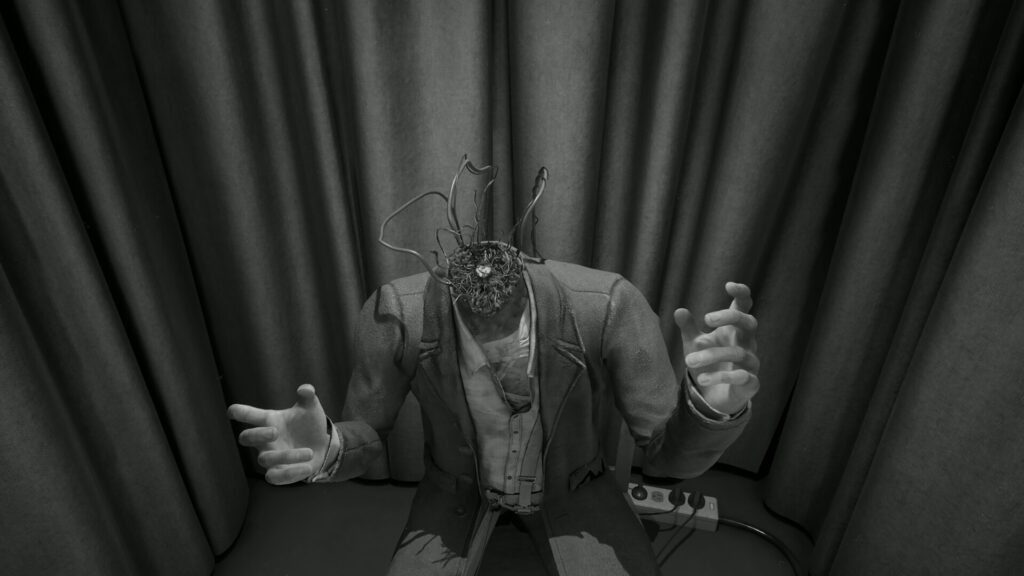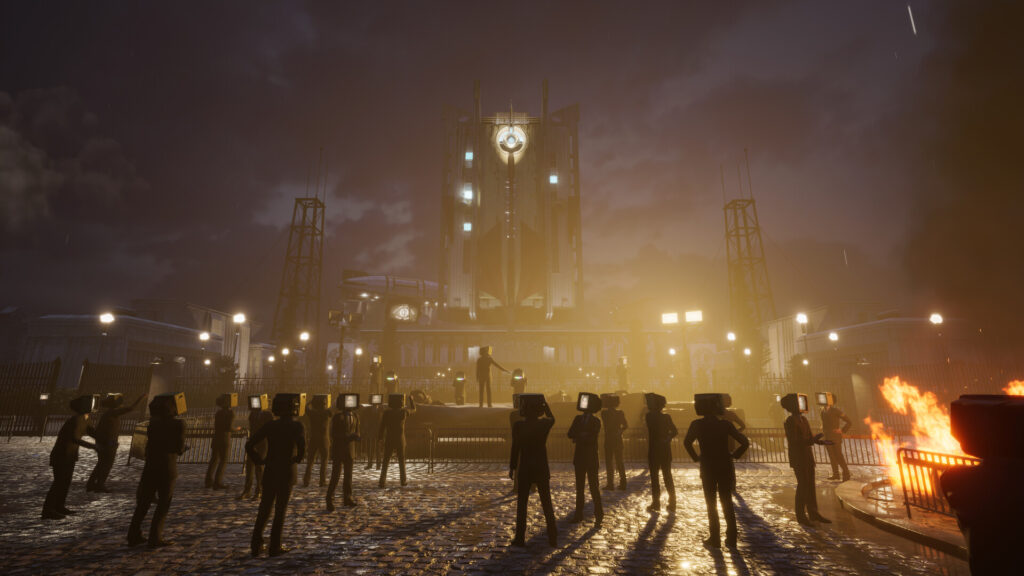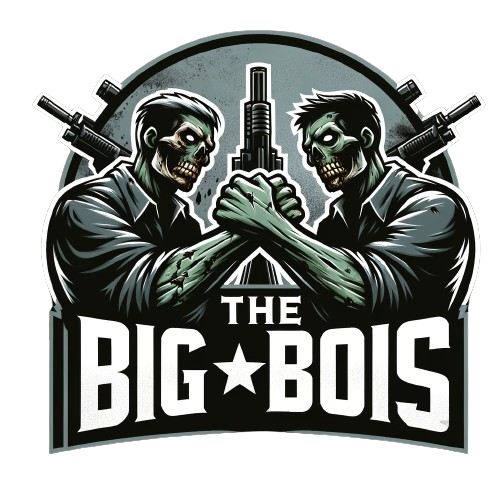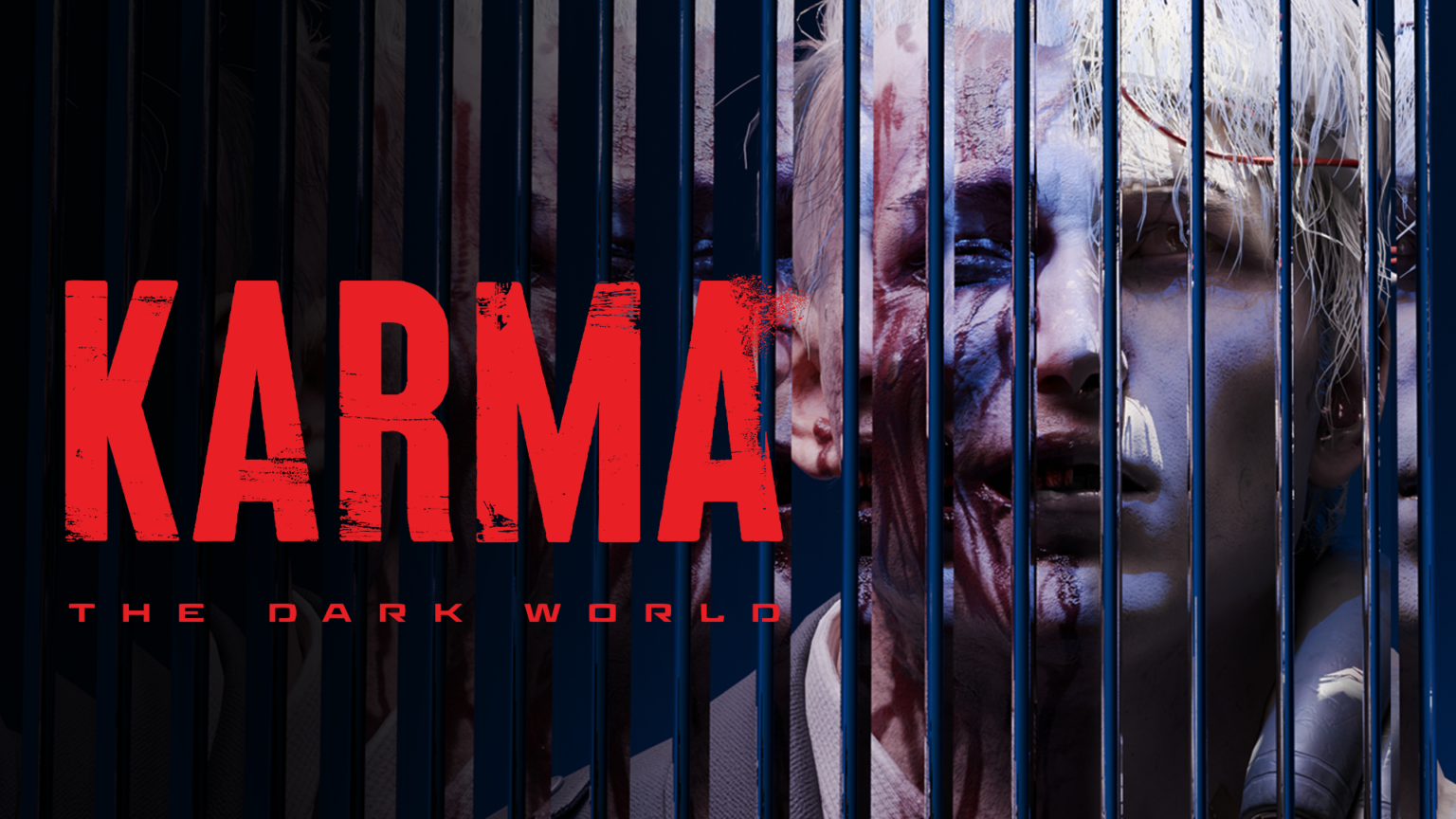Karma: The Dark World isn’t here to give you monsters in the closet or jump scares around every corner. It’s here to drag you into a hallucinatory maze of memory, trauma, and authoritarian surveillance—and then ask you to piece it all together while questioning your own perception of reality. Developed by Pollard Studio, this dystopian psychological thriller isn’t your average horror game. It’s a slow, cerebral spiral into existential dread wrapped in stunning visuals, bold themes, and atmospheric world-building.

Welcome to Leviathan’s World
You play as Daniel McGovern, a “Rome Agent” of the Leviathan Corporation—an Orwellian government body that blends oppressive bureaucracy with sci-fi biotech control. You’re assigned to investigate a suspected traitor named Shaun Mendes. But instead of interrogating him face-to-face, your mission sends you into Mendes’ fractured memories. These aren’t just flashbacks—they’re immersive, reality-bending simulations that unravel like nightmares.
What starts as a job quickly morphs into something deeply personal and morally ambiguous. As Daniel dives deeper, the lines between his identity, the subject’s past, and the corrupted world around them begin to blur.
Memory Diving as Gameplay
The game’s central mechanic revolves around “memory diving”—digitally entering a suspect’s consciousness to explore memories, solve puzzles, and uncover truth. These memory spaces are warped reflections of trauma and guilt, stylized in surreal and often disturbing ways.
Expect to:
- Navigate looping corridors that defy logic
- Piece together fragmented dialogues and visuals
- Solve environmental puzzles using audio logs, documents, and subtle clues
- Interact with memories of characters who may or may not exist
Unlike traditional horror games, there’s no combat here. Your tools are observation, interpretation, and patience.

Atmosphere Over Action
Visually, Karma: The Dark World is stunning. Built on Unreal Engine, it fuses Control’s brutalist interiors with Scorn’s grotesque bio-horror textures. Memory segments, in particular, are artistic showcases—floating objects, glitching environments, and dream logic dominate these moments, making you feel truly lost in someone else’s broken mind.
The sound design heightens this discomfort. Low hums, whispered dialogue, analog static, and oppressive silence all play into the game’s tension. The music rarely overwhelms but always lingers.
It’s not the kind of game that makes you scream—it makes you uncomfortable. And that’s the point.
The Narrative: Heavy, Human, and Horrifying
The story isn’t just dystopian for the sake of aesthetics. Leviathan’s world is cruel in ways that feel grounded in real-world anxieties—surveillance culture, authoritarian governments, corporate overreach, and social credit systems all play major roles.
But at its core, Karma is also about deeply personal pain. Shaun Mendes’ fractured memories tell a story of loss, guilt, and collapse—particularly involving his daughter, Grace. The emotional weight of these segments hits hard. Combined with the visual and narrative symbolism, the game manages to feel more like an art film at times than a traditional game.
Themes explored include:
- Identity and memory loss
- Government oppression and propaganda
- Childhood trauma and emotional neglect
- Mental health deterioration
- The blurred line between victim and perpetrator
It’s heavy, and it knows it.

What Works – The Game’s Strengths
✔ Unmatched Atmosphere
From brutalist government offices to surreal memoryscapes, the environments ooze dread and philosophical unease.
✔ Surreal Visual Design
TVs for heads, looping rooms, red-drenched dream spaces—the art direction is one of the most memorable aspects of the game.
✔ Narrative Depth
The story doesn’t just ask “what happened?”—it asks “what does it mean?” and “how did it hurt you?” Themes are ambitious and emotional.
✔ Memory Dive Mechanic
Diving into another person’s mind to uncover trauma is a powerful concept and executed with a unique stylistic flair.
✔ No Jump Scare Reliance
The game earns its horror through tone and story, not through cheap tricks.
✔ Audio and Voice Acting
Minimalist yet effective voiceovers, paired with unsettling sound design, build a soundscape that’s as eerie as the visuals.
✔ Lore and World-Building
The Leviathan Corporation feels real. Bureaucratic documents, terminals, and propaganda posters give this world a lived-in authenticity.
Where It Falters – Not for Everyone
❌ Pacing Can Drag
If you’re not fully invested in the story, the slow movement, extended dialogues, and long stretches of exploration may feel tedious.
❌ Unclear Objectives
The game intentionally obscures direction and purpose at times. While that fits the narrative, it can lead to frustration when you just want to progress.
❌ Simplistic or Clunky Puzzles
Some puzzles feel tacked on or overly simplistic. Others require guessing, with little feedback to guide you.
❌ Occasional Technical Roughness
Character animations don’t always match the quality of the environments, and some transitions between memory and reality are jarring.
❌ Emotionally Heavy Content
Themes of neglect, suicide, and mental breakdowns are frequent and not always handled gently. It can be triggering for some players.
Who Should Play Karma: The Dark World?
✅ You enjoy games like Observer, SOMA, or Silent Hill 2
✅ You’re drawn to dystopian sci-fi and noir aesthetics
✅ You prefer psychological tension over physical danger
✅ You don’t mind games with slow pacing and dense storytelling
✅ You like solving narrative-driven puzzles through observation
Skip this if:
❌ You want fast-paced gameplay or action
❌ You dislike being given minimal guidance
❌ You’re sensitive to heavy, traumatic themes
❌ You prefer games that explain everything by the end
KARMA: The Dark World: Karma: The Dark World is less about what you do and more about what it makes you feel. It’s a game built on mood, metaphor, and meaning—not on combat or action. And for those willing to let it pull them under, it delivers a rich, unsettling experience that lingers long after the credits roll. This isn’t horror by convention. It’s horror by erosion—of self, of memory, of trust in the systems around you. And that makes it far more chilling than anything with a shotgun or a monster in a hallway. – ColdMoon


